SAFETY DATA SHEET
Potassium Dichromate
1. IDENTIFICATION
Product Identifiers
Product Name:
Potassium Dichromate
Other Names:
Not available.
Product Number(s):
20100, EMS20100
CAS Number:
7778-50-9
Recommended use of the chemical and restriction on use
Laboratory chemicals.
Company Details
ProSciTech Pty Ltd
11 Carlton Street
KIRWAN QLD 4817
Australia(07) 4773 9444www.proscitech.com
11 Carlton Street
KIRWAN QLD 4817
Australia(07) 4773 9444www.proscitech.com
Emergency Contact Details
ProSciTech Pty Ltd
11 Carlton Street
KIRWAN QLD 4817
Australia(07) 4773 9444www.proscitech.com
11 Carlton Street
KIRWAN QLD 4817
Australia(07) 4773 9444www.proscitech.com
2. HAZARDS IDENTIFICATION
Classification of the substance or mixture
GHS03 Flame over circle
Ox. Sol. 2 H272 May intensify fire; oxidiser.
GHS06 Skull and crossbones.
Acute Tox. 3 H301 Toxic if swallowed.
Acute Tox. 2 H330 Fatal if inhaled.
GHS08 Health hazard.
Resp. Sens. 1 H334 May cause allergy or asthma symptoms or breathing difficulties if inhaled.
Muta. 1B H340 May cause genetic defects.
Carc. 1B H350 May cause cancer.
Repr. 1B H360 May damage fertility or the unborn child.
STOT RE 1 H372 Causes damage to the respiratory system through prolonged or repeated exposure.
GHS05 Corrosion
Skin Corr. 1B H314 Causes severe skin burns and eye damage.
GHS07
Acute tox. 4 H312 Harmful in contact with skin.
Skin Sens. 1 H317 May cause an allergic skin reaction.
Ox. Sol. 2 H272 May intensify fire; oxidiser.
GHS06 Skull and crossbones.
Acute Tox. 3 H301 Toxic if swallowed.
Acute Tox. 2 H330 Fatal if inhaled.
GHS08 Health hazard.
Resp. Sens. 1 H334 May cause allergy or asthma symptoms or breathing difficulties if inhaled.
Muta. 1B H340 May cause genetic defects.
Carc. 1B H350 May cause cancer.
Repr. 1B H360 May damage fertility or the unborn child.
STOT RE 1 H372 Causes damage to the respiratory system through prolonged or repeated exposure.
GHS05 Corrosion
Skin Corr. 1B H314 Causes severe skin burns and eye damage.
GHS07
Acute tox. 4 H312 Harmful in contact with skin.
Skin Sens. 1 H317 May cause an allergic skin reaction.
Label Elements
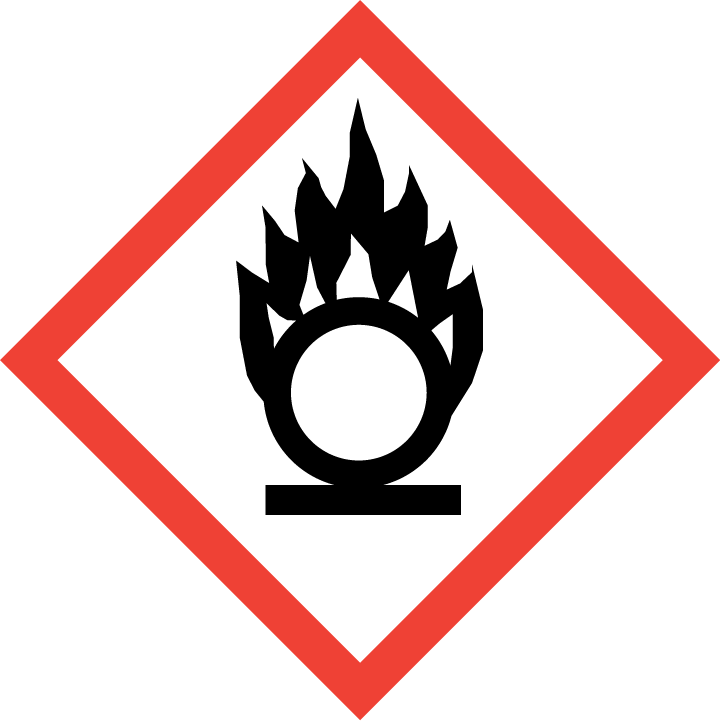
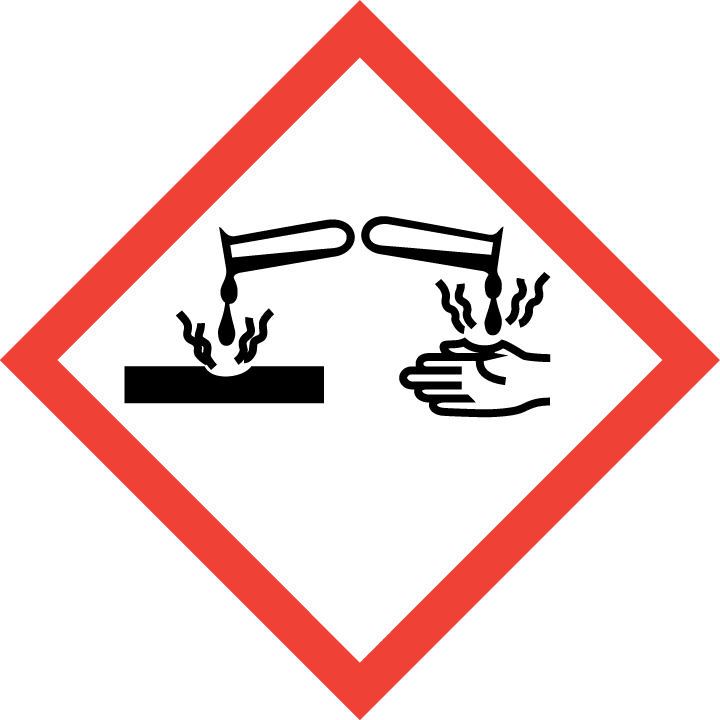
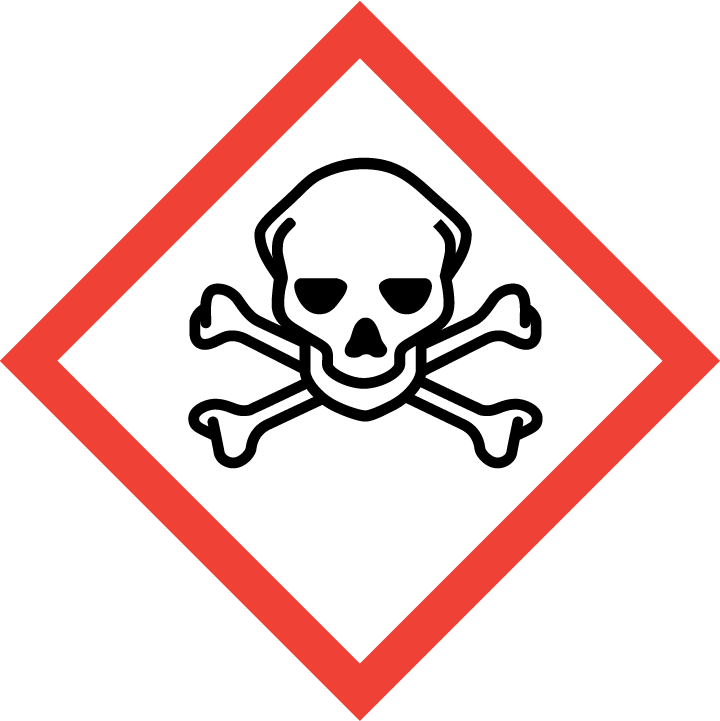
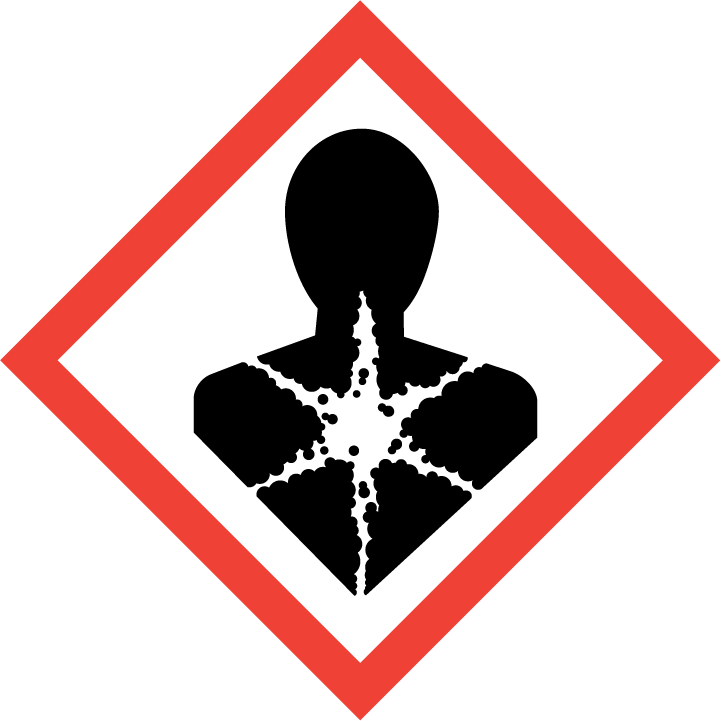
Signal Words
Danger
Hazard Statement(s)
May intensify fire; oxidiser.
Toxic if swallowed.
Harmful in contact with skin.
Fatal if inhaled.
Causes severe skin burns and eye damage.
May cause allergy or asthma symptoms or breathing difficulties if inhaled.
May cause an allergic skin reaction.
May cause genetic defects.
May cause cancer.
May damage fertility or the unborn child.
Causes damage to the respiratory system through prolonged or repeated exposure.
Toxic if swallowed.
Harmful in contact with skin.
Fatal if inhaled.
Causes severe skin burns and eye damage.
May cause allergy or asthma symptoms or breathing difficulties if inhaled.
May cause an allergic skin reaction.
May cause genetic defects.
May cause cancer.
May damage fertility or the unborn child.
Causes damage to the respiratory system through prolonged or repeated exposure.
Precautionary Statement(s)
Obtain special instructions before use.
Do not handle until all safety precautions have been read and understood.
Keep away from heat.
Keep/store away from clothing/combustible materials.
Take any precaution to avoid mixing with combustibles.
Do not breathe dusts or mists.
Wash thoroughly after handling.
Do not eat, drink or smoke when using this product.
Use only outdoors or in a well-ventilated area.
Contaminated work clothing should not be allowed out of the workplace.
Wear protective glove/protective clothing/eye protection/face protection.
Wear respiratory protection.
Do not handle until all safety precautions have been read and understood.
Keep away from heat.
Keep/store away from clothing/combustible materials.
Take any precaution to avoid mixing with combustibles.
Do not breathe dusts or mists.
Wash thoroughly after handling.
Do not eat, drink or smoke when using this product.
Use only outdoors or in a well-ventilated area.
Contaminated work clothing should not be allowed out of the workplace.
Wear protective glove/protective clothing/eye protection/face protection.
Wear respiratory protection.
Primary route(s) of entry
Not available.
Human Health
Inhalation:
Remove victim to fresh air and keep at rest in a position comfortable for breathing. If experiencing respiratory symptoms: Call a POISON CENTER/doctor.
Ingestion:
Immediately call a POISON CENTER/doctor. Rinse mouth. Do NOT induce vomiting.
Eyes:
Rinse cautiously with water for several minutes. Remove contact lenses, if present and easy to do. Continue rinsing. If exposed or concerned: Get medical advice/attention.
Skin:
(Or hair) Remove/take off immediately all contaminated clothing. Rinse skin with water/shower. Take off contaminated clothing and wash it before reuse. If skin irritation or rash occurs: Get medical advice/attention. Wash contaminated clothing before reuse.
Environment
In case of fire: Use for extinction: CO₂, powder or water spray.
Store in a well-ventilated place. Keep container tightly closed.
Store locked up.
Dispose of contents/container in accordance with local/regional/national/international regulations.
Store in a well-ventilated place. Keep container tightly closed.
Store locked up.
Dispose of contents/container in accordance with local/regional/national/international regulations.
3. COMPOSITION/INFORMATION ON INGREDIENTS
No information available.
4. FIRST AID MEASURES
Ingestion
Do not induce vomiting; call for medical help immediately.
Drink plenty of water and provide fresh air. Call for a doctor immediately.
Drink plenty of water and provide fresh air. Call for a doctor immediately.
Inhalation
Supply fresh air or oxygen; call for doctor.
In case of unconsciousness place patient stably in side position for transportation.
In case of unconsciousness place patient stably in side position for transportation.
Skin Contact
Immediately wash with water and soap and rinse thoroughly.
Eye Contact
Rinse opened eye for several minutes under running water. Then consult a doctor.
Other Information
Immediately remove any clothing soiled by the product.
Symptoms of poisoning may even occur after several hours; therefore medical observation for at least 48 hours after the accident.
Remove breathing equipment only after contaminated clothing have been completely removed.
In case of irregular breathing or respiratory arrest provide artificial respiration.
Symptoms of poisoning may even occur after several hours; therefore medical observation for at least 48 hours after the accident.
Remove breathing equipment only after contaminated clothing have been completely removed.
In case of irregular breathing or respiratory arrest provide artificial respiration.
5. FIREFIGHTING MEASURES
Suitable extinguishing equipment
Use fire extinguishing methods suitable to surrounding conditions.
HAZCHEM
No further relevant information available.
Special protective equipment and precautions for fire fighters
6. ACCIDENTAL RELEASE MEASURES
Personal precautions, protective equipment and emergency procedures
Wear protective equipment. Keep unprotected persons away.
Environmental precautions
Inform respective authorities in case of seepage into water course or sewage system.
Do not allow to enter sewers/surface or ground water.
Do not allow to enter sewers/surface or ground water.
Methods and materials for containment and clean up
Use neutralising agent.
Dispose contaminated material as waste according to item 13.
Ensure adequate ventilation.
Dispose contaminated material as waste according to item 13.
Ensure adequate ventilation.
7. HANDLING AND STORAGE
Precautions for safe handling
Thorough dedusting.
Ensure good ventilation/exhaustion at the workplace.
Open and handle receptacle with care.
Keep respiratory protective device available.
Ensure good ventilation/exhaustion at the workplace.
Open and handle receptacle with care.
Keep respiratory protective device available.
Conditions for safe storage
8. EXPOSURE CONTROLS/PERSONAL PROTECTION
Exposure Standards
Material
TWA ppm
TWA mg/m3
STEL ppm
STEL mg/m3
7778-50-9 Potassium Dichromate
0.05mg/m³
Engineering controls
Keep away from foodstuffs, beverages and feed.
Immediately remove all soiled and contaminated clothing.
Wash hands before breaks and at the end of work.
Store protective clothing separately.
Avoid contact with the eyes and skin.
Immediately remove all soiled and contaminated clothing.
Wash hands before breaks and at the end of work.
Store protective clothing separately.
Avoid contact with the eyes and skin.
Personal protective equipment
Eye and face protection
Tightly sealed goggles.
Skin protection
Protective gloves. The glove material has to be impermeable and resistant to the product/the substance/the preparation. Selection of the glove material on consideration of the penetration times, rates of diffusion and the degradation. The exact break through time has to be found out by the manufacturer of the protective gloves and has to be observed.
Body protection
Wear protective clothing.
Respiratory protection
In case of brief exposure or low pollution use respiratory filter device. In case of intensive or longer exposure use self-contained respiratory protective device.
9. PHYSICAL AND CHEMICAL PROPERTIES
General information
Appearance
Crystalline of colour not determined.
Odour
Characteristic
pH
3.5
Vapour Pressure
0hPa
Density
2.68g/cm³
Boiling Point
Undetermined
Melting Point
398°C
Solubility
125g/l with water at 20°C
Specific Gravity of Density
Not available.
Flash Point
Not applicable.
Flammable (Explosive) Limits
Not determined.
Ignition Temperature
Not determined.
Formula
K2Cr2O7
10. STABILITY AND REACTIVITY
Reactivity
No further relevant information available.
Chemical stability
No decomposition if used according to specifications.
Possibility of hazardous reactions
No dangerous reactions known.
Conditions to avoid
No further relevant information available.
Incompatible materials
No further relevant information available.
11. TOXICOLOGICAL INFORMATION
Acute effects
Oral LD50 190 mg/kg (mouse)
Eye contact
Strong caustic effect.
Skin contact
Caustic effect on skin and mucous membranes. Sensitisation possible through skin contact.
Ingestion
Swallowing will lead to a strong caustic effect on mouth and throat and to the danger of perforation of oesophagus and stomach.
Inhalation
Sensitisation possible through inhalation.
Toxicity and irritation
Muta. 1B, Carc. 1B, Repr. 1B
12. ECOLOGICAL INFORMATION
Ecotoxicity
Very toxic for fish.
Persistence and degradability
No further relevant information available.
Bioaccumulative potential
No further relevant information available.
Other adverse effects
Water hazard class 3: extremely hazardous for water.
Do not allow product to reach ground water, water course or sewage system, even in small quantities.
Must not reach sewage water or drainage ditch undiluted or unneutralised.
Danger to drinking water if even extremely small quantities leak into the ground.
Also poisonous for fish and plankton in water bodies.
Very toxic for aquatic organisms.
Do not allow product to reach ground water, water course or sewage system, even in small quantities.
Must not reach sewage water or drainage ditch undiluted or unneutralised.
Danger to drinking water if even extremely small quantities leak into the ground.
Also poisonous for fish and plankton in water bodies.
Very toxic for aquatic organisms.
13. DISPOSAL CONSIDERATIONS
General information
Must not be disposed together with household garbage. Do not allow product to reach sewage system.
Disposal must be made according to official regulations.
Disposal must be made according to official regulations.
14. TRANSPORT INFORMATION
ADG label required
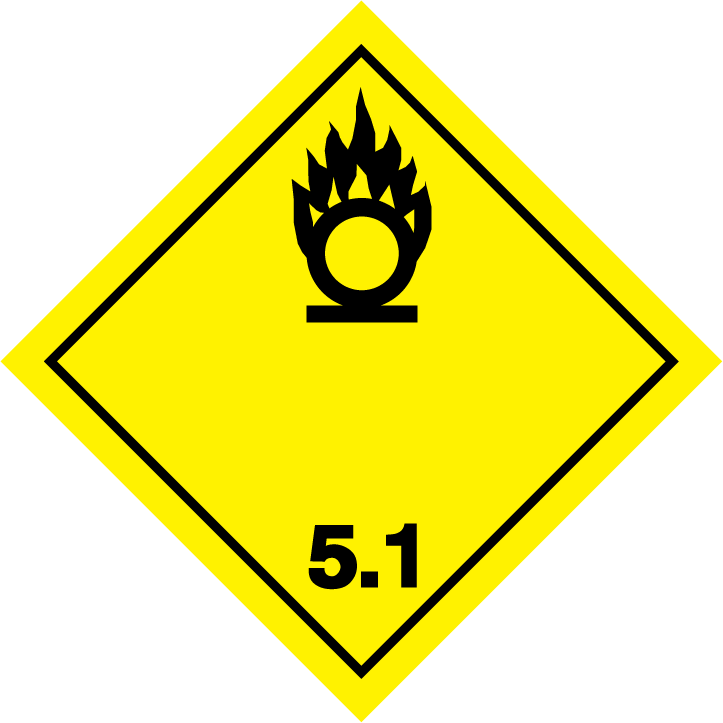
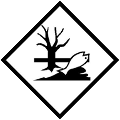
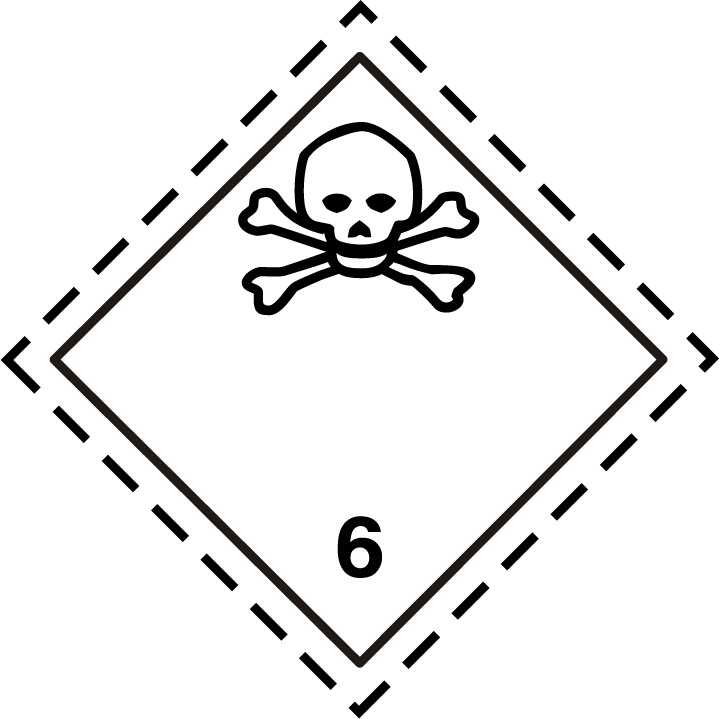
HAZCHEM
No further relevant information available.
UN Number
UN3086
Proper shipping name
3086 TOXIC SOLID, OXIDISING, N.O.S. (Potassium Dichromate), ENVIRONMENTALLY HAZARDOUS.
Transport hazard class
Class 6.1 Toxic substances.
Label 6.1+5.1
Label 6.1+5.1
Packing group
I
Environmental hazard
Environmental hazards: Environmentally hazardous substance, solid.
Marine Pollutant: Yes (DOT)
Special marking (ADG): Symbol (fish and tree).
Marine Pollutant: Yes (DOT)
Special marking (ADG): Symbol (fish and tree).
Special precautions for users
Warning: Toxic substances.
Hazard identification number (Kemler cade): 665
EMS Number: F-A,S-Q
Stowage Category: E
Hazard identification number (Kemler cade): 665
EMS Number: F-A,S-Q
Stowage Category: E
Additional information
Limited quantities (LQ) 0
Excepted quantities (EQ) Code: E5
Maximum net quantity per inner packaging: 1g
Maximum net quantity per outer packaging: 300g
Transport category: 1
Tunnel restriction code: C/E
Excepted quantities (EQ) Code: E5
Maximum net quantity per inner packaging: 1g
Maximum net quantity per outer packaging: 300g
Transport category: 1
Tunnel restriction code: C/E
15. REGULATORY INFORMATION
Poisons Schedule Number
Substance is not listed.
Other Information
Workers are not allowed to be exposed to this hazardous material. Exceptions can be made by the authorities in certain cases.
A Chemical Safety Assessment has not been carried out.
A Chemical Safety Assessment has not been carried out.
16. OTHER INFORMATION
SDS preparation date
4 May 2023
Comments
This information is based on our present knowledge. However, this shall not constitute a guarantee for any specific product features and shall not establish a legally valid contractual relationship.
This Safety Data Sheet (SDS) has been prepared in compliance with the Preparation of Safety Data Sheets for Hazardous Chemicals Code of Practice February 2016. It is the user's responsibility to determine the suitability of this information for adoption of necessary safety precautions. The information published in this SDS has been compiled from the publications listed in Section 16: to the best of our ability and knowledge these publications are considered accurate. We reserve the right to revise Safety Data Sheets as new information becomes available. Copies may be made for non-profit use.